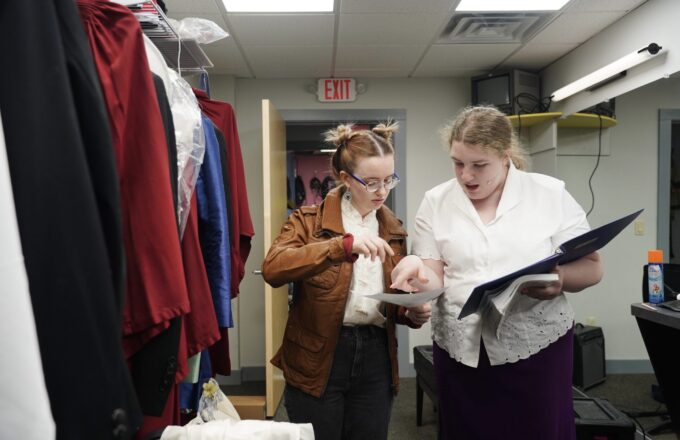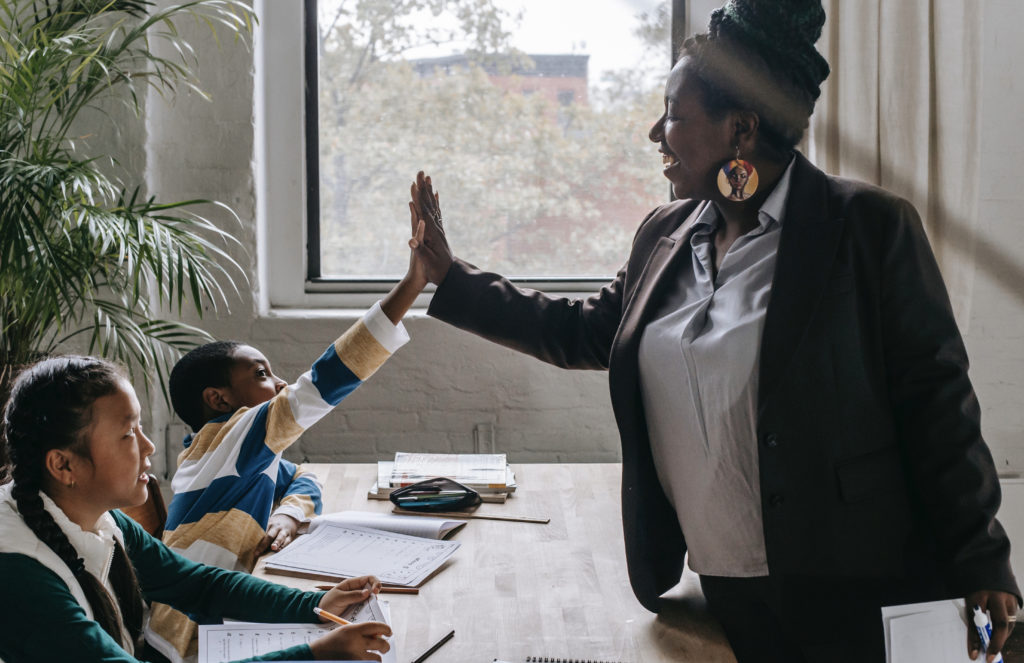We’re excited to share that Kaia’s blog has also been featured on Dr. Tim Rasinski’s website.
Check it out!
I have taught high school English for 20 years, and almost all of those years have been spent at the Landmark School in Beverly, Massachusetts. Landmark is a school for students with language-based learning disabilities, like dyslexia. Teaching at a school like Landmark means that all my students have struggled with reading and writing at some point in their educational careers. Mostly, I teach students who are at the end of high school, 11th and 12th grade. The majority of them have been at Landmark long enough to trust their own intelligence and abilities, and they willingly participate in tasks that require reading and writing.
My classroom can feel like a typical English high school classroom. We engage in many of the same activities reading many classic, grade-level texts, engaging in higher-order class discussions, and writing analytical essays. However, it is a small group setting, and we take longer to work through books, dedicating much focus to study and literacy skills. It is a balancing act between nurturing the intelligence of my students and supporting their language-based learning differences. Thus, I am always on the lookout for ways to work in foundational literacy skills.
I’ve known about reader’s theater for years. I’d wrongly assumed, based on the name, that this popular fluency strategy that promotes wide and deep reading was reserved for oral reading of plays and speeches. In a class focused on literature, I thought it would be difficult to adapt. However, when I attended a lecture by Dr. Timothy Rasinski about reading fluency, and he fully explained how the strategy is used, I realized the error in my assumption. I learned that a reader’s theater certainly works with plays and speeches, but that it can also work with any type of text as students are essentially making a script out of a text.
Reader’s Theater for The Odyssey
Recently, my students and I were finishing Robert Fitzgerald’s translation of The Odyssey, and I thought that it would make an excellent text to turn into a script. There are clear scenes and adventures that Odysseus embarks on, and there is a lot of action to communicate. After we’d read the chosen excerpts, taken notes, discussed Odysseus’ hubris and dubious choices and liaisons as he sailed through ancient Greece, I asked them to create a 5-7 minute script from their favorite scene from the epic poem. I encouraged them to let Homer and Fitzgerald do 80% of the writing for them and to focus their attention on figuring out how to break up the text, how to transition from narration to dialogue, and how to create stage direction and movement. All of this would require that they read and re-read their chosen selection, that they ask questions about things they didn’t understand, and that they deeply understood the plot, character motivation, and setting of their selection.
I wasn’t sure how this was going to be received. Teens are tough. The too-cool-for-school attitude can run deep. Would they all be too self-conscious to really explore Odysseus’ emotions? Would they see right through it as a shameless plug for practicing their fluency and think it was too baby-ish? Would they just search the internet for a digital copy of the poem, mindlessly break out the text into parts, and then dully read it aloud in front of the class?
Thankfully, I was so wrong. They were into it. They were focused and on task – nary a cell phone in sight! They asked for more time to refine and tweak their script and more time to practice reading it aloud to ensure they were smooth and clear. They asked if they could change the outcome or details about the text. It was wonderfully impressive to see them so excited about such an old story and anyone who teaches high school knows that this level of engagement can be elusive.
And the results were hilarious and so fun to watch. One group decided to modernize Odysseus’ interaction with Hermes and Circe, changing Hermes’ potion to a dating app, encouraging Odysseys to “swipe right” when confronting Crice. Another group decided that their skit would not render true unless they purchased a muscle shirt for Odysseus to wear as he attempted to outsmart the Cyclops. While there were many fun and engaging moments, there were also many positive academic outcomes. Part of the assignment was that they needed to practice and rehearse their script and that they needed to really work to embody the tone and pitch of the characters’ emotions. Which, if you read between the lines, is just another way of saying that they engaged in repeated reading and focused on prosody – two key features of fluency practice.
And if fluency is the bridge to comprehension, this practice of wide and deep engagement with the content of the story led to improvements in their comprehension. Without classroom activities that require wide and deep reading, whether that is a focus on paraphrasing language, a structured dissection of important passages or creating a reader’s theater script, I find that they miss the nuance of some of the stories we read. They are sometimes fuzzy on the exact order of events and unclear on the motivations of a character. Using reader’s theater not only helped sneak in fluency practice, it also helped students cross that bridge into deep comprehension of the story we read. In their final assessments, they were able to more clearly communicate their understanding of Odysseus’ motivations. I noticed that I processed less with students about what to say and how to say it when writing. The creation of a script and the engagement with the text that it required, allowed them to demonstrate a higher level of comprehension of the materials, and this was clearly shown in the essays that they produced.
I am glad my assumption about reader’s theater was wrong; I can’t wait to watch how they bring the next story we read to life!
Sample Student Script*
(*Script was created by 11th grade students and has not been edited for clarity)
- Jamie = Eurylochus
- Joey = Cyclops
- Josie = Narrator
- Jesse = Odysseus
Narrator: On Odysseus’s adventures, he got thrown around the sea in many different directions. After many delays, he ends up on the island of the Cyclops. A huge monster with one evil eye. Odysseus and his men decide to go up and see what the Cyclops is about. He took his best fighter, Eurylokus, and started his adventure.
Odysseus: Come here Eurylochus your my best fighter so accompany me on my adventure.
Eurylochus: Yes master Odysseus,
Odysseus: Alright let’s head up
Narrator: They traveled up the mountain until they found a vast cavern.
Odysseus: Who could possibly live in such a gigantic place
Eurylochus(crew): Hopefully someone with enough food to spare with us, great Odysseus
Narrator: They went inside to find it empty, except for a rack of cheeses, and pens full of lambs.
Odysseus: Alright, let’s wait here.
Eurylochus: “Why not take these cheeses, get them stowed, come back, throw open all the pens, and make a run for it? We’ll take the lambs aboard. Say we put out again on good salt water!”
Odysseus: “I refuse. I wish to see the caveman, and what he has to offer.”
Eurylochus: But Odysseus we must continue our Journey home
Narrator: They lit a fire and took some cheeses to eat and sat in silence around the embers. Eventually, the caveman came back “When he came, he had a load of dry branches on his shoulder to stoke his fire.” “When all these chores were done, he poked the fire, heaping on brushwood.” In the glare, he saw the men.
Cyclops: “Strangers, who are you? And where from? What brings you here by seaways- fair traffic? Or are you wandering rogues, who cast your lives like dice, and ravage other folk by sea.”
Odysseus: “We are from Troy. Achaeans, blown off course by shifting gales on the Great South Sea: homeward bound, but taking routes and ways uncommon”. “Here we stand beholden for your help, or any gifts you give – as custom is to honor strangers. We would entreat you, great sir, have a care for the god’s courtesy”
Cyclops: I, the almighty Cyclops do not care for your journey and hear of thundering Zeus. I will not let you, or you’re friends go.
Eurylochus: Please, large monster, spare us, we are hungry and lost and we must find our way home.
Crew: (walks towards Cyclops) “Please give us food”
Cyclops: smack!!!!(kills man)
Odysseus: (starts to weep on my hands and knees.) You bastard!
Eurylochus: Ahhhh, we must leave Odysseus, he will kill us all
Narrator: Odysseus realized that they would all be killed if he angered the Cyclops, so he decided to trick him instead.
Odysseus: “Cyclops, try some wine. Here’s liquor to wash down your scapes of men. Taste it, and see the kind of drink we carried under our planks. I mean it as an offering if you would help us home.”
Cyclops: *drinks * What’s your name?
Odysseus: Approaches the Cyclops with a smirk, “Cyclops you ask my honorable name? Remember the gift you promised me. And I shall tell you. My name is nobody: mother. Father. And friends. Everyone calls me nobody.”
Cyclops:“Oh nobody mmmm nobody” *Tirely Says* nobody is my meat, then I will eat his friend.
Narrator: They slowly got the Cyclops drunk until he fell into a deep sleep
Cyclops: (drunkenly passed out against the wall) Starts to snore.
Odysseus: (rummaging through Cyclops stuff) Come here and help me, Eurylokus.
Eurylochus: Yes Master Odysseus, anything for you
Odysseus: (picks up strange bottle) Look what I found. It looks like a potion
Eurylochus: Be careful Oddyseus, it may not be safe to eat
Odysseus: (drinks a potion)
Eurylochus: OH my gosh Odysseus you’re so BIG!!!!
Odysseus: haha, we found the Cyclops’ secret now I can defeat him in battle (walks over and starts to fight
FIGHT / Loose / Crew helps/ Right before Cyclops kills Odyseaus)
Eurylochus: (stabs Cyclops eye)
Cyclops: NOBODY IS HURTING ME NOBODY IS HURTING ME(falls to the ground moaning
Odysseus and Eurylokus: (runs out)
Odysseus: RUN! We can’t let the Cyclops catch up.
Odysseus: Everyone set sail set sail. Get to the boat, set the ship now!
Odysseus: Oh Cyclops, how do you like the beating we gave you? Eater of guests, Zeus, and the gods have paid you
Eurylochus: For god sake, Captain, Why bait the beast again? Leave him alone! He’ll smash our timbers and heads together.
Cyclops: Nobody I will get you!
Odysseus: (On the ship with his men and start to set sail)
Odysseus: Cyclops, if ever mortal man inquire, how you were put to shame and blinded, tell him Odysseus, raider of cities, took your eye: Laertes’ son, whose home’s on Ithaca
Eurylochus: Odysseus, quit this nonsense now. It was me who hurt the Cyclops not you!
Cyclops: Friend Odysseus hurt me (throws massive boulder and misses.) COME BACK Odysseus, I will treat you well, praying from the god of Earthquake to befriend you– His son I am, for he by his avowal fathered me, and, if he will, he may heal me of this black wound.
Odysseus: If I could take your life, I would and take your time away, and hurl you down to hell! The god of earthquake, Zeus, could not heal you there!
Cyclops: (throws paper at the/rock)
Eurylochus: OUR SHIPS GONNA SINK
Odysseus: Worry not we will make it out / Sails away
Narrator: Going into this adventure, Odysseus thought he was a solo unit and did not need anyone’s assistance. This experience proved him wrong. He would not have been able to defeat the Cyclops without the help of his best fighter. This damaged his ego but made him realize that it is okay to rely on others and that he is not the best to exist. This will benefit him in the future and on his future excursions.



